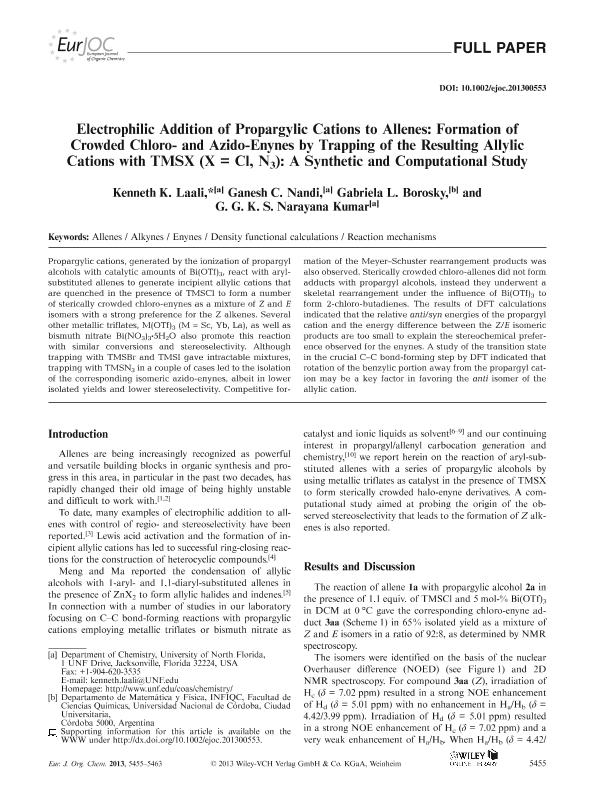Artículo
Electrophilic addition of Propargylic cations to allenes: formation of crowded Chloro- and Azido-Enynes by trapping of the resulting allylic cations with TMSX (X = Cl, N3): a synthetic and computational study
Fecha de publicación:
07/2013
Editorial:
Wiley VCH Verlag
Revista:
European Journal of Organic Chemistry
ISSN:
1434-193X
Idioma:
Inglés
Tipo de recurso:
Artículo publicado
Clasificación temática:
Resumen
Propargylic cations, generated by the ionization of propargyl alcohols with catalytic amounts of Bi(OTf)3, react with arylsubstituted allenes to generate incipient allylic cations that are quenched in the presence of TMSCl to form a number of sterically crowded chloro-enynes as a mixture of Z and E isomers with a strong preference for the Z alkenes. Several other metallic triflates, M(OTf)3 (M = Sc, Yb, La), as well as bismuth nitrate Bi(NO3)3·5H2O also promote this reaction with similar conversions and stereoselectivity. Although trapping with TMSBr and TMSI gave intractable mixtures, trapping with TMSN3 in a couple of cases led to the isolation of the corresponding isomeric azido-enynes, albeit in lower isolated yields and lower stereoselectivity. Competitive formation of the Meyer–Schuster rearrangement products was also observed. Sterically crowded chloro-allenes did not form adducts with propargyl alcohols, instead they underwent a skeletal rearrangement under the influence of Bi(OTf)3 to form 2-chloro-butadienes. The results of DFT calculations indicated that the relative anti/syn energies of the propargyl cation and the energy difference between the Z/E isomeric products are too small to explain the stereochemical preference observed for the enynes. A study of the transition state in the crucial C–C bond-forming step by DFT indicated that rotation of the benzylic portion away from the propargyl cation may be a key factor in favoring the anti isomer of the allylic cation.
Palabras clave:
Allenes
,
Propargylic Alcohols
,
Metallic Triflates
,
Tmsx
Archivos asociados
Licencia
Identificadores
Colecciones
Articulos(INFIQC)
Articulos de INST.DE INVESTIGACIONES EN FISICO- QUIMICA DE CORDOBA
Articulos de INST.DE INVESTIGACIONES EN FISICO- QUIMICA DE CORDOBA
Citación
Laali, Kenneth K.; Nandi, Ganesh C.; Borosky, Gabriela Leonor; Narayana Kumar, G. G. K. S.; Electrophilic addition of Propargylic cations to allenes: formation of crowded Chloro- and Azido-Enynes by trapping of the resulting allylic cations with TMSX (X = Cl, N3): a synthetic and computational study; Wiley VCH Verlag; European Journal of Organic Chemistry; 2013; 24; 7-2013; 5455-5463
Compartir
Altmétricas




